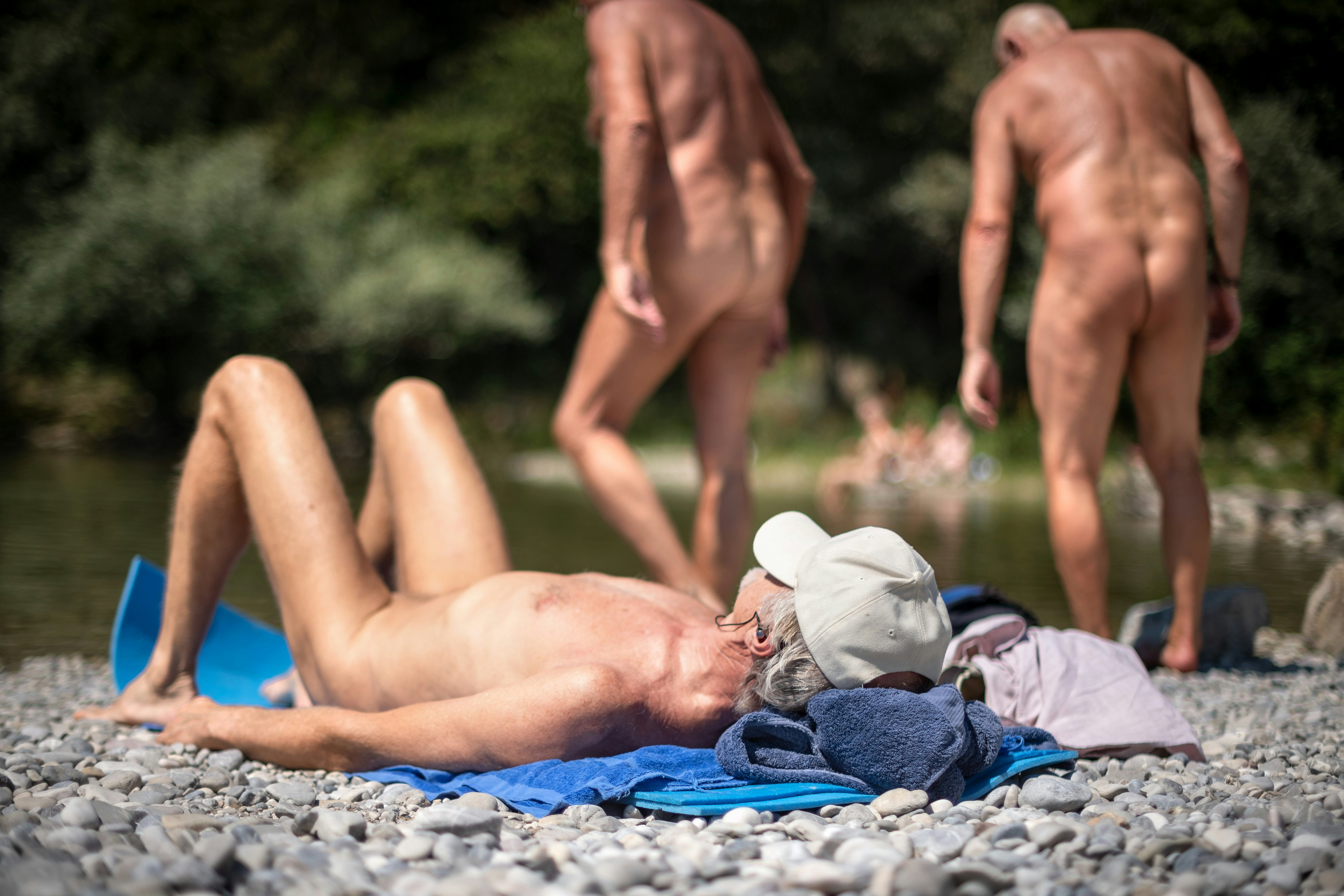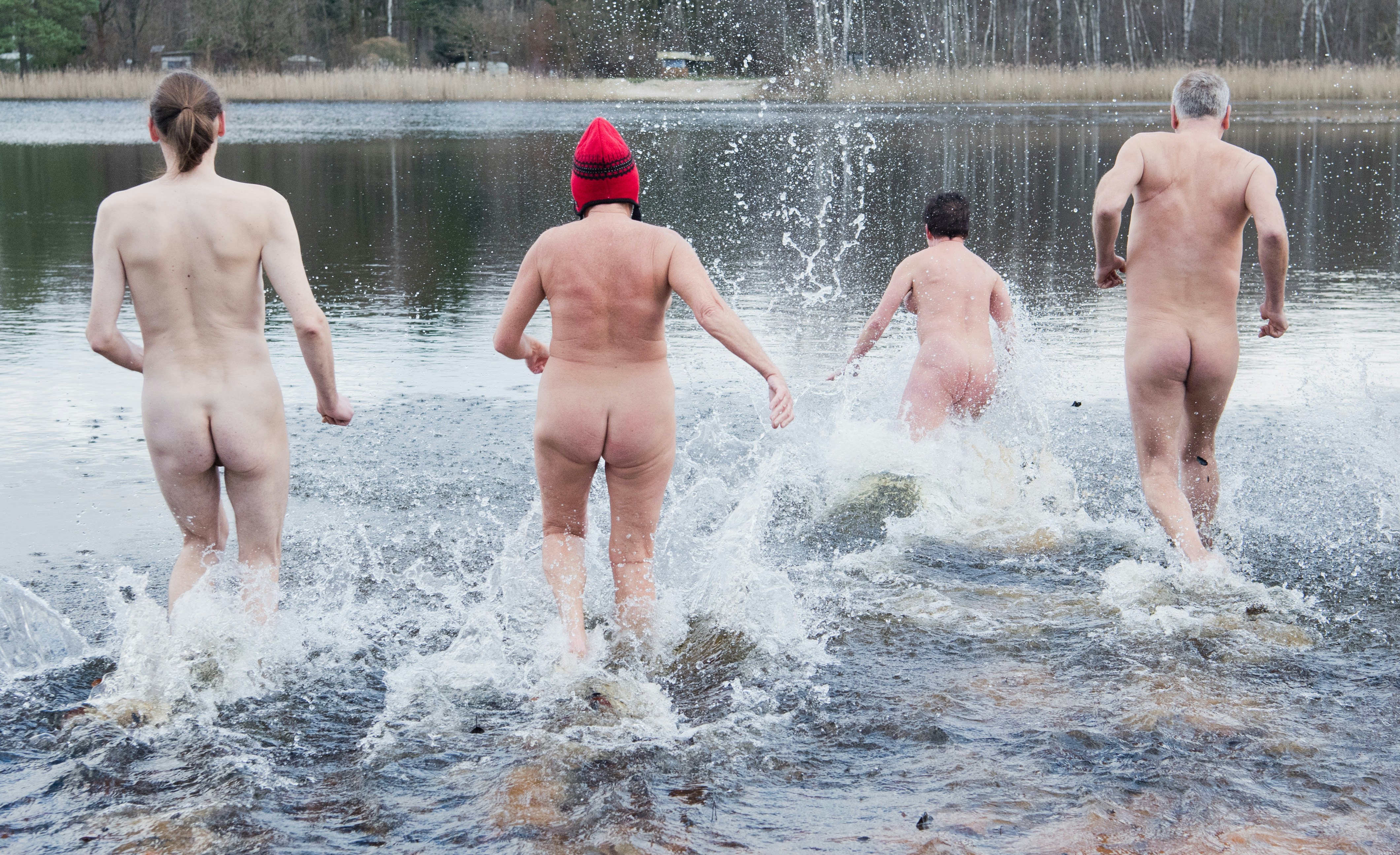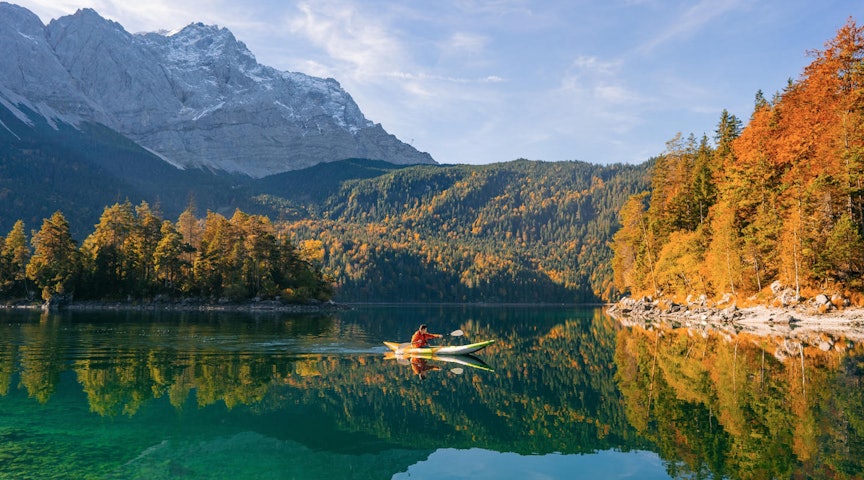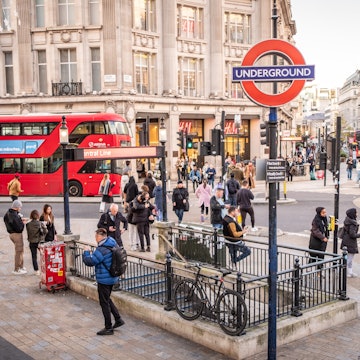

Germans began exploring naturism as a way to improve mental health © Sina Schuldt/ Picture Alliance via Getty Images
If you see a sign, obey it. This is the first rule I learned as an American living in Germany. The crosswalk lights are not suggestions. Everyone waits for the little green man to appear, and unless you want to be scolded by fellow pedestrians, you better wait too.
"Verboten" means verboten, and if someone spots you doing something verboten, they'll be quick to let you know that it is, indeed, verboten. Just as their trains are run with efficiency, their rules are made with reason. This fact of life is so sensible no local would dare stray from the path of cultural competence.
So, if you see a sign that says "FKK," the proper German thing to do is take off all your clothes.

FKK, or Freikörperkultur, translates to Free Body Culture. This community-based form of naturism started in the late 19th century when Germans began exploring nudity as a means to improve their mental and physical well-being. It’s a non-erotic celebration of the human form, often practiced in nature, and sometimes connected to athletics.
Germany’s naturist founder
Germany's first nude beach opened on the northern island of Sylt in 1920. Adolf Koch, a Berlin-born schoolteacher and early FKK advocate, led the naturism movement in post-World War I Germany by opening 13 training facilities devoted to nude athletics.
The Nazi regime shut Koch's schools and largely curtailed the practice due to its socialist sentiments, but naturism quickly regained popularity after the war. (Nearly a century later, FSV Adolf Koch e.V. is once again an internationally renowned FKK community center in Berlin.)
Related article: All the questions you're too embarrassed to ask about naturism

Opponents look to stop naturism
Communist rulers in Eastern Germany also attempted to put a kibosh on naturism in the mid-20th century, but people fought back, and nude beaches were legalized again in 1956. Inland lakes and stretches of the Baltic coastline became favorite naturist outposts. Casting off their mass-produced Communist couture to sunbathe in the buff was Eastern Germany's form of freedom.
Clothes weren't quick to come back on even after the Iron Curtain came down. On the night the Berlin Wall fell, it's rumored Germany's first female chancellor, Angela Merkel opted for a nude schvitz in a sauna before heading west to see what all the fuss was about.
Related article: Exploring the German bathhouse culture
Freedom of going natural
It may seem strange that a culture synonymous with the phrase ordnung muss sein (order must be) would be so accepting of throwing caution to the wind when it comes to clothing. But at its core, FKK is both order and freedom stripped down to their purest form.
For Julian, current chairman at Adolf Koch in Berlin, freedom was found on a warm summer's night at age 17 while skinny dipping with friends.
"I had visited saunas and nude beaches with my parents before - especially as a child," Julian says. "But this experience… was a key moment as I felt particularly connected to myself, to nature and also to my friends. It felt liberating, so I wanted to feel this way more often."
Julian became a regular guest participant at Adolf Koch's nude volleyball and swimming events in 2012. He joined as a community member in 2016 and assumed the role of chairman earlier this year.
Among the myriad sports and body awareness activities in which Julian participates, he particularly appreciates Adolf Koch's all-are-welcome outdoor events in spring and summer, including nude hikes and canoeing.
"They are really highlights in my life," he says. "[Naturism] creates more intense connectedness with others and nature and thereby feels meaningful."
Julian isn’t alone in feeling this way. Nearly 600,000 Germans are registered at different FKK clubs around the country.

Joining the club
Although Julian lives nearly 4,000 miles away from my home in New York City, I can't help but feel a kinship. Growing up on a small lake in upstate New York, skinny dipping became my family's summertime rite-of-passage.
Cloaked in the humid night air, I'd run to the end of our dock, leap into the black abyss, and land in the arms of the lake below. With the woosh of water around my usually-clothed thighs and the laughter of my siblings as we splashed about in moonlight, I felt alive.
But outside these fleeting summer moments, my Puritcanical American upbringing taught me to shroud myself in a blanket of modesty. My "parts" were "private" – always eroticized and always hidden. As an adult, I didn't experience the same meaningful interconnectedness described by Julian until I saw a sign in Munich announcing I was entering a nudist area.
It was a blisteringly hot summer's day, and I was standing at the entrance to Flaucher, a popular public nudist spot on Munich's icy Isar River when I saw it. I decided to behave like a proper sign-abiding German, applied copious amounts of sunblock to my never-been-sun-kissed upper thighs, and ripped off my clothes faster than a bandaid.
I half-expected an arrow to start blinking in the direction of my genitals, but the only thing that came my way was a young boy with hay-blonde hair running past me toward his naked grandfather. I was a naked stranger in a naked land watching naked Germans flit about Flaucher like wild fairies in a midsummer's nude dream. Only it wasn't a dream – it was a totally typical Bavarian day.

Other German naturist communities
Outside of no-clothes communities like Adolf Koch in Berlin, clothing-optional lakes and beaches are ubiquitous in Germany. As Felix Kanbach, a 39-year-old Munich native who frequents Flaucher, told me, "...we have lots of places where being nude isn't even 'no big deal'... no one will care."
In 2014, the city designated six official areas for naturism, including two sections of the tourist hotspot Englischer Garten.
Berlin's Tiergarten is another famous urban park known for legal nudity. Julian is a particular fan of Teufelssee, a clothing-optional lake 30 minutes outside Berlin. While these areas are more laissez-faire with their no-clothes policy, it's only good sense to join the textilfrei throngs.
Related article: This nude cruise redefines fun in the sun
What naturism teaches you
When it comes to physical activity, Julian explains that "not wearing clothes ... allows for better feedback from your body. Clothes can limit your repertoire of movements."
It's also easier to correct skeletal alignment issues without fabric hiding your limbs. Most importantly, naturism helps people feel more comfortable in their skin. By being naked around your peers, you can reevaluate unrealistic body image issues perpetuated by popular media.
Julian believes nudity helps people "...realize there’s nothing to shame about your body or specific parts of your body." A practical side effect of naturism, he coquettishly adds, is that "you don't need to wash your clothes so often."
He's right. I left Flaucher that day with my clothes unsullied and my bathing suit dry. Wearing a smile a mile wide, I giggled to myself. In order to feel free, I had to obey the signs. There’s simply nothing more German.
Take your Germany trip with Lonely Planet Journeys
Time to book that trip to Germany
Lonely Planet Journeys takes you there with fully customizable trips to top destinations – all crafted by our local experts.

























